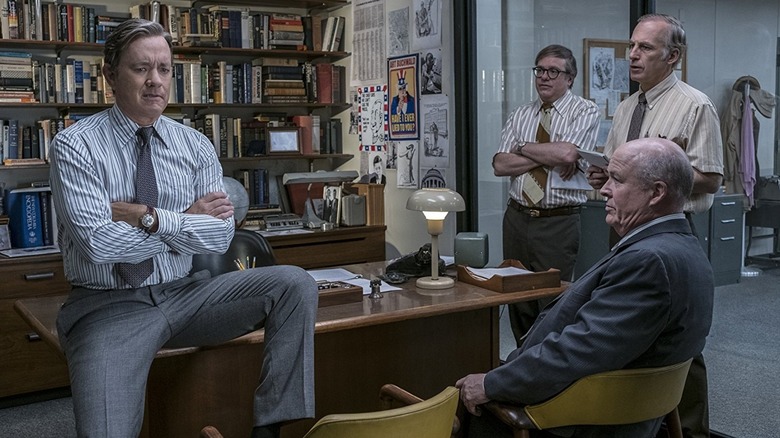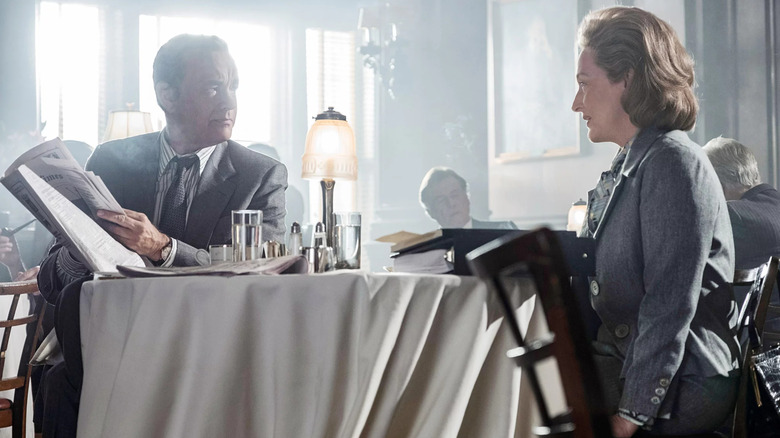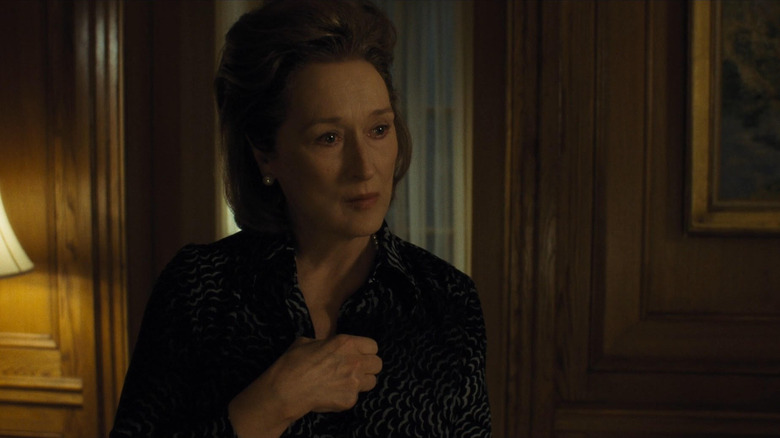Getting The Post Made Was A Dead Sprint For Steven Spielberg
Steven Spielberg's film "The Post" might be considered part of a thematic series that will hereby be dubbed the Current Events Trilogy. In "Munich," "Lincoln," and "The Post," Spielberg took significant moments from the past — Operation Wrath of God, the passing of the Thirteenth Amendment, the publication of the Pentagon Papers — and used them as clear metaphors for the dark milieu of the present. Judging by their timing, "Munich" is very much a film about the post-9/11 world, "Lincoln" is about the legalization of same-sex marriage, and "The Post" is about the abiding corruption of the Trump administration and the role journalism has in confronting it. They are sophisticated works of a mature filmmaker and might be counted as Spielberg's best.
"The Post," released on December 22, 2017, might even be the first major studio release made in direct response to Trump's inauguration, 11 months before. Spielberg became involved in the project in February, and one might easily posit that Trump was very much on the filmmaker's mind. He made "The Post" from May through November, a turbulent time in the United States to say the least. It was an enormously quick turnaround for a studio release of such prestige and might be Spielberg's timeliest movie.
According to a 2017 panel discussion with, well, the Washington Post, Spielberg revealed just what a quick production the film was. As he explains it, he had to take a brief break from production on an unmade film to make "The Post." It was the smaller film he seemingly slipped in on the side.
Hang On, Player One
"The Post" is about the Washington Post, and how it was operating in 1971. Katharine Graham (Meryl Streep) has been in charge of the paper for years, but still encounters grave disrespect wherever she goes. Just as the paper is about to go public, it catches wind of a story about the United States' real — and corrupt — reasons for engaging in the Vietnam War. Against legal advice, Graham chooses to publish. Much of the film is told inside the Post's dull offices with intelligent newspapermen (led by Tom Hanks) finding facts and weighing the ethics of potentially blowing the lid off of Vietnam War deceptions.
Spielberg recalls the shooting conditions, and how the script — by Liz Hannah and Josh Singer — really grabbed him. In his words:
"And I was absolutely, you know, just totally involved in ["Ready Player One"] when I got a call from [head of 20th Century Fox] Stacey Snider and [producer] Amy Pascal, who suggested I read a script that Amy had found from a brand-new writer who had never sold anything before in her entire life. Liz Hannah, 31 years old. She had written a story about Katharine Graham, who she has always been quite admiring of."
Spielberg was reluctant to read it, but Snider and Pascal assured him "you'll change your mind once you get to page 30."
"And I did," Spielberg said. He tells about how he read the script and immediately began casting it. Hanks, he knew right away, was to play Ben Bradlee, and Streep was to play Graham.
The Kidnapping of Edgardo Mortara
The director has already made four films with Hanks, but only worked with Streep for a brief, 30-minute period, on the 2001 film "A.I. Artificial Intelligence." Steep played the voice of a robotic Blue Fairy. Spielberg was eager to make a "real movie" with her. He knew he had to move fast, though, because the script was so staggeringly relevant. He said that it started to come together "because this could not have been a more relevant story for our time that really made me look back and say, 'My god, how does history repeat itself?'"
His producer also pushed him to get the lead out. As he tells it:
"I gave it at that point to [producer] Kristie Macosko — who has been in my life for 20 years, producing my films and just doing an exceptional job of co-running my company. And I gave it to her, and she said to me, 'Look, if you really want to make this — and I think you should; I think this is really something you should do — you're going to work harder than you've ever worked before, because to get this film out this year.' Which is what I wanted to do! She said, 'It's going to have to be, put everything else aside, and you have to just jump into this, make a full commitment.'"
In a fit of good timing, Spielberg was having trouble casting a film called "The Kidnapping of Edgardo Mortara," which required a six-year-old in the lead. Spielberg was going cross-eyed while looking at audition tapes, and he had to put the film aside. "Ready Player One" was already in post-production, so his schedule suddenly opened up.
The opening allowed him to make one of his best movies.


